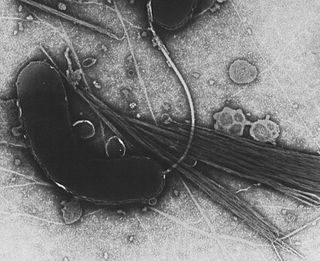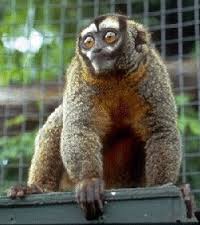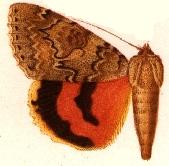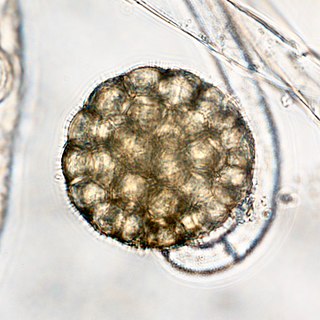
The Vibrionaceae are a family of Proteobacteria given their own order, Vibrionales. Inhabitants of fresh or salt water, several species are pathogenic, including the type species Vibrio cholerae, which is the agent responsible for cholera. Most bioluminescent bacteria belong to this family, and are typically found as symbionts of deep-sea animals.

Nancy Ma's night monkey is a night monkey species from South America. It is found in Brazil and Peru.

El Privilegio de Amar is a Mexican telenovela produced by Carla Estrada for Televisa. It aired on Canal de las Estrellas from July 27, 1998 to February 26, 1999. El Privilegio de Amar is a remake of the 1985 Venezuelan novela, Cristal. El Privilegio de Amar is the highest-rated television program in Mexico to date, it registered an average of 34.8 percent of TV audience. The telenovela received TVyNovelas Award for Best Telenovela, in 1999.
Paratelmatobius gaigeae is a species of frog in the family Leptodactylidae. It is endemic to Serra da Bocaina, a part of Serra do Mar, southeastern Brazil. Paratelmatobius gaigeae is named after Helen Beulah Thompson Gaige, an American herpetologist.
Gliese 3685 is a star in the constellation of Leo. It is extremely faint; its apparent magnitude is 13.3, and can only be seen with a ten-inch (25 cm) telescope. Based on a parallax of 50.30 milliarcseconds, the system is located 65 light years away from the Earth.
Arctostaphylos luciana is a species of manzanita known by the common name Santa Lucia manzanita, is endemic to California. .

Catocala luciana, the shining underwing, is a moth of the family Erebidae. The species was first described by Herman Strecker in 1874. It is found in western North America, as far east as Minnesota and Illinois and northward into extreme southern Alberta and Saskatchewan. It occurs widely across the Great Plains, south to New Mexico, Arizona and California.

Vera Cruz (Bahia) is a municipality in the state of Bahia in the North-East region of Brazil. It occupies 87% of the island of Itaparica; the remainder is belongs to the municipality of Itaparica. The municipality of Vera Cruz has a population of is 43,716 and covers an area of 297.537 square kilometres (114.880 sq mi).
Cassiduloida is an order of sea urchins. The group was extremely diverse with many families and species during the Mesozoic, but today, only seven extant species remain.
Pepesuchus is an extinct genus of carnivorous metasuchian from the Late Cretaceous period. It is a peirosaurid which lived during the Campanian and Maastrichtian stages of the Late Cretaceous in what is now state of São Paulo, Brazil.

Jenny Tamburi, born as Luciana Tamburini, was an Italian actress and television hostess. Her first stage name was "Luciana della Robbia" and after her first film she changed it to "Jenny Tamburi".
Edwardsiidae is a family of sea anemones. Edwardsiids have long thin bodies and live buried in sediments or in holes or crevices in rock.

Luciana Diniz is a Brazilian-born Portuguese equestrian whose discipline is show jumping. She currently ranks thirteenth on the FEI Rolex Ranking List. In addition to her show jumping work, Diniz is also known for G.R.O.W., an "informal education philosophy" that teaches adults and children. She is also started a documentary series on her horses called the Hoofprint Series.
Deraniyagala's beaked whale is a species of mesoplodont whale.

Pinocchio is a two-episode Italian-British miniseries directed by Alberto Sironi, based on the 1883 novel The Adventures of Pinocchio by Carlo Collodi and filmed in English. It first aired on the Italian channel Rai 1 on November 1 and 2, 2009.

Backusella is the sole genus of zygote fungi in the family Backusellaceae, which is classified in the order Mucorales. Members of this genus have been often isolated from plant litter, from locations around the world.
Enterovibrio is a genus of bacteria from the family of Vibrionaceae.
Enterovibrio calviensis is a halophilic and facultatively oligotrophic bacterium species from the genus of Enterovibrio which has been isolated from sea water from the Bay of Calvi from the Mediterranean Sea in France.
Enterovibrio coralii is a bacterium species from the genus of Enterovibrio.
Enterovibrio nigricans is a bacterium species from the genus of Enterovibrio which has been isolated from the head kidney of the fish Sparus aurata from the Mediterranean coast in Spain.







